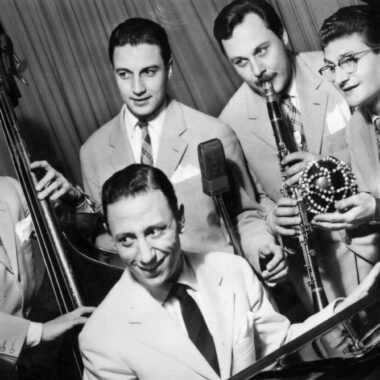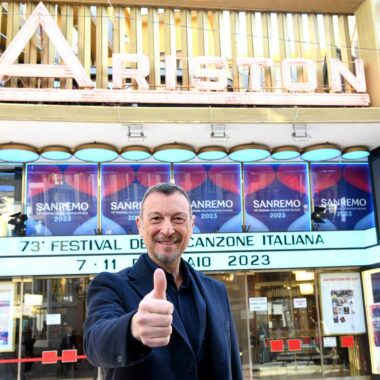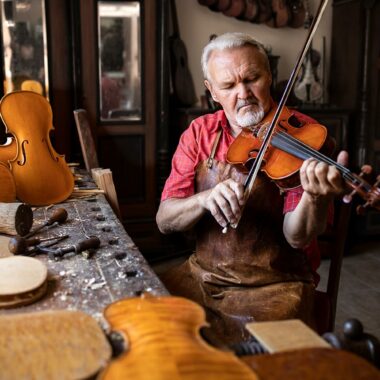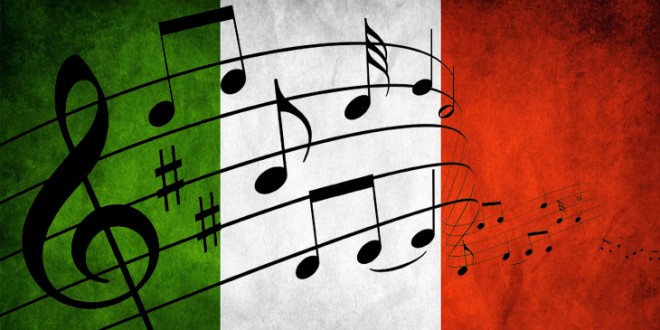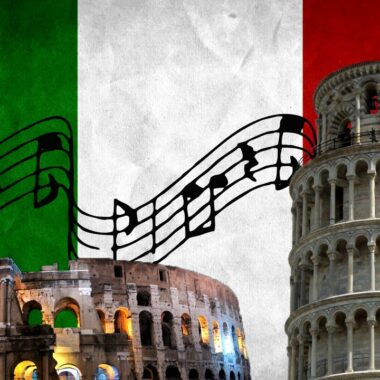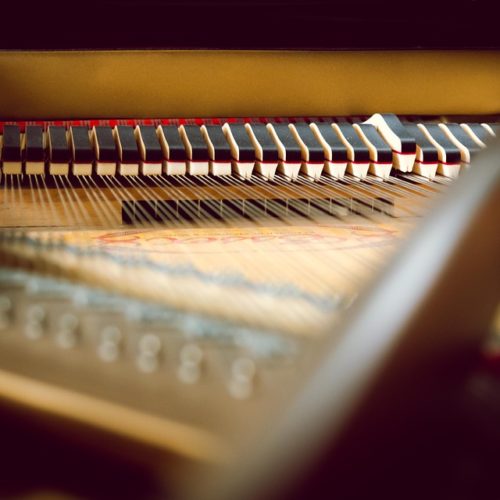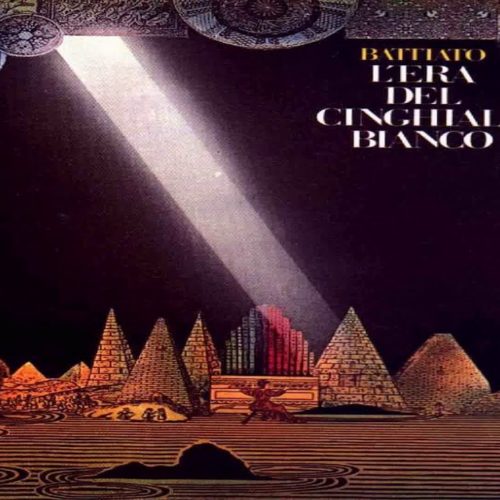Italy: A Music Lover’s Paradise
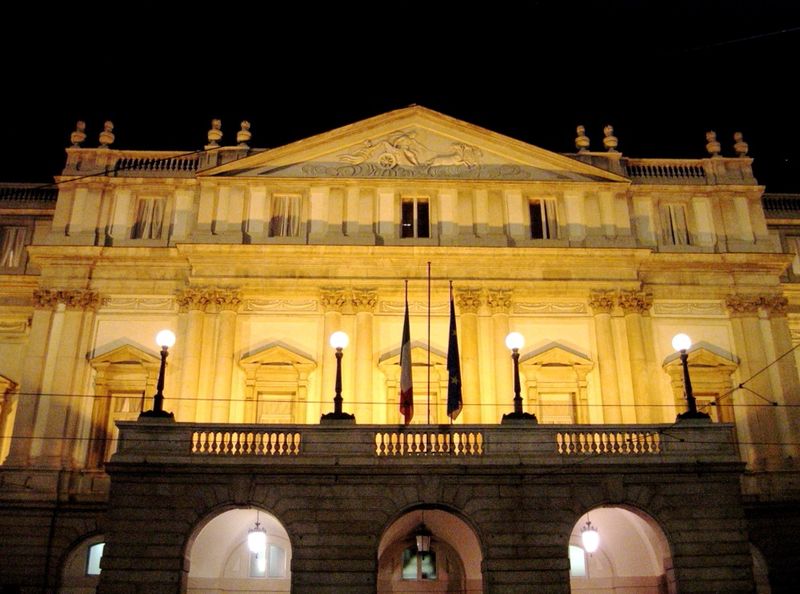
The first time I stayed in Rome for an extended visit, I had the opportunity to hang out with an American expat who had an apartment in Trastevere. The neighborhood there was very working-class and family-oriented, and the multi-storied apartment building wrapped around a courtyard. My friend’s living room overlooked the courtyard, and in the warm summer evenings you could hear the details of every conversation, discussion and angst-filled argument that took place in the entire building. It was positively Babel-like.
I asked my friend what it was like to live amongst such cacophony. He replied:
“It’s a part of life here. Italy’s the birthplace of opera – and in Italy, everything’s an opera!”
His words were a revelation to me. As an opera musician, a violinist with the Metropolitan Opera in New York, I certainly lived opera eight days a week – and I loved every minute. From the very first moment I had touched down on Italian soil, I felt I had ‘come home.’ Now I knew why.
I have always had very deep feelings about music; it has fed my soul since childhood. Purportedly, or at least according to my mom (who was known to exaggerate, but oh well – she was Russian), I first sang when I was six months old. I started tinkling the piano keys at age five, at which age I plunged into the study of ballet. I began violin lessons at nine – my father was my first teacher – and became proficient at piano by age fourteen. My mother listened religiously to the Met radio broadcasts every Saturday afternoon, and the strains of opera permeated my soul from an early age. In the summers, my parents took me to the outdoor concerts of the Detroit Symphony every night without fail. “She shall have music wherever she goes,” declares the nursery rhyme. Music was everything to me.
But I had never experienced anything close to the scope of music that lives and breathes in the Italian soul. In Italy, music is everywhere, from the opera stage to the cafés to the exalted halls of the cathedrals. Everyone I met in Italy could quote passages from Verdi, Puccini and Bellini. Everyone, from the “Barbiere di Busseto” to the waiters in the local ristorante knew the plots and characters of all the Italian operas. It was like the Met without walls. I was enchanted.

On many subsequent visits to my beloved Italia, I made a number of pilgrimages to Italy’s operatic haunts and captured some of these in my novel, “Travels With My Lovers.” As the heroine wanders the cities and countrysides of this Mecca of the opera world, she seeks out the places that inspired operas and captured the imagination of the composers’ souls. Her first encounter takes place at a festa in Firenze’s Piazza Signoria:
“Then, in a band shell also built for the occasion, a large number of musicians with wind instruments gathered and prepared to perform…made up of doctors from the city who (were) amateur musicians.
“There was no announcement about the piece to be played; just the appearance of the conductor on the podium, a bit of perfunctory tuning and the most heartfelt rendering of Verdi’s impassioned Vespri Siciliani overture that I had ever witnessed. My eyes virtually lit up as I gasped in delight…
“I let the music wash over me, its penetrating intensity evoking an opera plot full of intrigue, conspiracy, jealousy and lust for power.
“Here was an overture bursting with swelling tunes, searing colors and intense images, which portrayed an event – the thirteenth-century Sicilian insurrection – that held an esteemed place in the history of Italy’s quest for independence and individuality. And here was I, celebrating its magnificence with its extraordinary citizens.
“The few out-of-tune notes and other inaccuracies of the playing did nothing to detract from the exquisite feeling of experiencing the profound love of these devoted musicians for the music of their esteemed compatriot and composer, Verdi. And I recognized that henceforth, when I myself played this particular overture, its passion and expressiveness would incite feelings much more profound than any I had ever known in my musical life thus far.”
Not far from Firenze in kilometers, but a world away in ambience, the heroine discovers yet another aspect of opera lore in San Gimignano:
“The two of us headed over to the monastery, parked the car just outside the imposing-looking walls and approached. I felt like I had entered the set of Verdi’s opera, La Forza del Destino, as we tugged at the heavy bell-pull over the entrance. The massive door creaked open, and an attractive middle-aged woman in an apron responded.
“The woman, evidently the matron of the establishment, eyed us with seeming distaste and doubt; then she motioned us inside and shut the ancient door behind us, with a sound so final that I almost jumped out of my skin at the thought of being locked away there forever.
“Of course, I had never actually been inside an active cloister (not counting the Cloisters Museum in New York, which of course was not active); and upon taking in my surroundings, I felt even more acutely than before the sensation of having happened upon an opera set.
“We followed the Matron down a series of long, dark, echoing hallways, our footsteps making hollow sounds on the stone floors. To say that the atmosphere was somber would be putting it mildly. There was not a soul anywhere in sight…
“After we had settled in and prepared ourselves for dinner, (we) crept again down the long hallways to inform the Matron that we were going out. We saw her entering a room near the front entryway, leaving the door slightly ajar, and we peeked in. I felt like I had been beamed directly onto the Metropolitan Opera stage.
“The room was dark and windowless, lit only by a pair of candles at either end of a long, heavy oak dining table, seated in the middle of which were two dour-looking monks in the requisite dark robes. The Matron was serving them their evening meal. It was like Tosca meets The Godfather in the Abbey of The Name of the Rose – spooky, to say the least.”
Later on, the heroine sets herself a goal to follow the “Puccini Trail .” After paying homage to his birthplace in Lucca, she decides to do a: “… Puccini pilgrimage: to the hilltop convent that had inspired the composer to write his tender, sentimental opera, Suor (Sister) Angelica…(and) to Puccini’s villa at the seaside lake in Viareggio.
“I set off with trepidation, though fortunately I was armed with a fluent command of the Italian language, thanks to years of listening to opera lyrics, lots of lengthy conversations with Carlo and my infamous little blue book (dizionario.)
“I drove up into the hills, seemingly in the middle of nowhere, to find the Convento Sant’Agata, scene of Suor Angelica, the second in a trilogy of one-act operas that Puccini had composed late in life. These were not the lush, rolling hills of Chianti country, but unadorned, simple-looking rises that proclaimed an uncomplicated country life. The surroundings seemed a perfect reflection of the story of this opera, a bittersweet paean to the pain and pleasure of the human condition.
“The convent was so far off the beaten track that I had to stop several times to ask local farmers where and how to find it. When at last I drove down the dusty, out-of-the-way road leading to the entrance of the seventeenth century compound, I found the modest setting to be identical to the one I had so often glimpsed during my performances at the opera house. There, in a cypress-lined courtyard, stood a plain iron cross set atop a boulder positioned in the middle; a tiny church with a cloister behind it; a small cemetery beyond the cloister’s arches; and a minuscule spring at the back, which trickled into an earthenware pot.
“It was all very idyllic…I sighed nostalgically, saying a silent blessing for having been led to this place. Rumor had it that Puccini used to visit his sister, a Mother Superior, at this very convent. The atmosphere was magical, and I could truly understand how this environment and its regional flavor might have stirred him to create the gloriously mystical music of the opera. Certainly, as an opera musician, it meant a great deal to me to view the authentic source of the composer’s inspiration… the enigmatic mystery of the Catholic Church.
“Eventually I tried to go into the little church, but it was locked, and I realized that the convent had been completely abandoned; no one lived here anymore, a fact I found terribly sad. Not wishing to further disturb the spirits who occupied the sacred place, I took my leave and drove on. “As I made my way through the countryside I was unable to stop myself from thinking wistfully of the third opera in the trilogy, Gianni Schicchi, which took place in Florence.
“After that, it seemed that I had been driving forever when I finally reached the sea near Viareggio. There was, however, no lake in sight and, puzzled, I stopped in a convenience store to ask directions to Torre del Lago, Puccini’s lakeside villa. The bemused padrone smiled at me.
” ‘Follow this road to the very end,’ ” he instructed. ‘Casca proprio nell’lago. You will fall right into the lake.’ “
“Embarrassed at my apparent inability to discover this simplistic solution myself, I got back in the car and followed the road. As he had predicted, the lake was right there. It was easy to identify Puccini’s villa, for it was the only edifice in the little resort town that was old or grandiose enough to have belonged to the region’s Favorite Son. At the lake’s edge stood a statue of the great composer, sporting his characteristic jaunty, wide-brimmed hat, cigar and bemused smile. I felt like I had come home.
“Noticing that a group had formed in front of the villa, I quickly joined them for an Italian-speaking tour, not wanting to wait for the English-speaking one later on. I paid close attention to the guide’s easily understood Italian as he led us through the elegant, well-appointed rooms, pointing out the Maestro’s piano, the Maestro’s writing desk, where he had composed Turandot and La Fanciulla del West…
‘”E qui, nella mura,’ he said finally, gesturing at the wall, ‘si trova il Maestro.’ “
“I looked at the wall in question, gasping audibly. Was it true? Puccini himself was entombed inside that wall? It was too creepy to contemplate, although evidently the Maestro’s wife and daughter and a modicum of other relations had been installed there as well. It placed the notion of family togetherness in a completely different light.
“The villa as mausoleum: this was a whole new concept for me, as I later tried to get over my incredulity while relaxing on the tourist boat which glided across the mirror-like surface of Puccini’s lake. Europeans, I decided, had a perception of death that was extremely unlike ours: theirs was a culture that wasn’t squeamish about outwardly worshipping their cultural gods or openly displaying the remains of fallen heroes.”
Ultimately the heroine reflects upon how her travels to the birthplace of opera have inspired her to change her life:
“Once back in New York, I walked about as if in a dream, craving all things Italian… I discovered in myself a new-sprung craving for the music of Puccini, especially the opera Manon Lescaut… I sat in the orchestra pit at the opera house, pouring my heart and soul into my violin playing, surrounded by the music and atmosphere and language of Italy… I would sigh nostalgically at (Gianni) Schicchi’s tongue-in-cheek yet heartfelt evocation, ‘Addio Firenze’…
“This personal journey of discovery of foreign lands would be the fulfillment of the excitement that I craved; the embodiment of my search for my cultural roots, which were in the Europe of Verdi, Puccini, Rossini – of opera.
“Most operas are either tragic or comic, but more than that they are slices of life, a combination of comedy and tragedy. That was what I loved about opera: its portrayal of the human condition. “Now it was time to explore my own needs for adventure, my own sources of happiness – to write the opera of my own life. And I was ready to do it with a vengeance.”
Perhaps your own travels to Italy might not evoke such revolutionary – or even revelatory – musings. Or maybe your own experiences won’t be as life altering as they were for the heroine of Travels With My Lovers. But I am willing to bet that a pilgrimage to even one of the operatic destinations in the country that witnessed the birth of opera will help you to hear opera with new ears – and to see your own non-Italian world in a completely different light.
Former Metropolitan Opera violinist Erica Miner turned to writing as her creative muse when injuries suffered in a car accident forced her to give up her musical career. She has won awards for her screenplays, novels and poetry, including the Fiction Prize in the Direct From The Author Book Awards for her novel, “Travels With My Lovers.” Erica’s work has become known through book signings, interviews and speaking engagements, and she has been named a ‘top-rated’ lecturer for Celebrity Cruise Lines.
We suggest listening to La Piccola Lirica, read more about it here!
By Erica Miner



